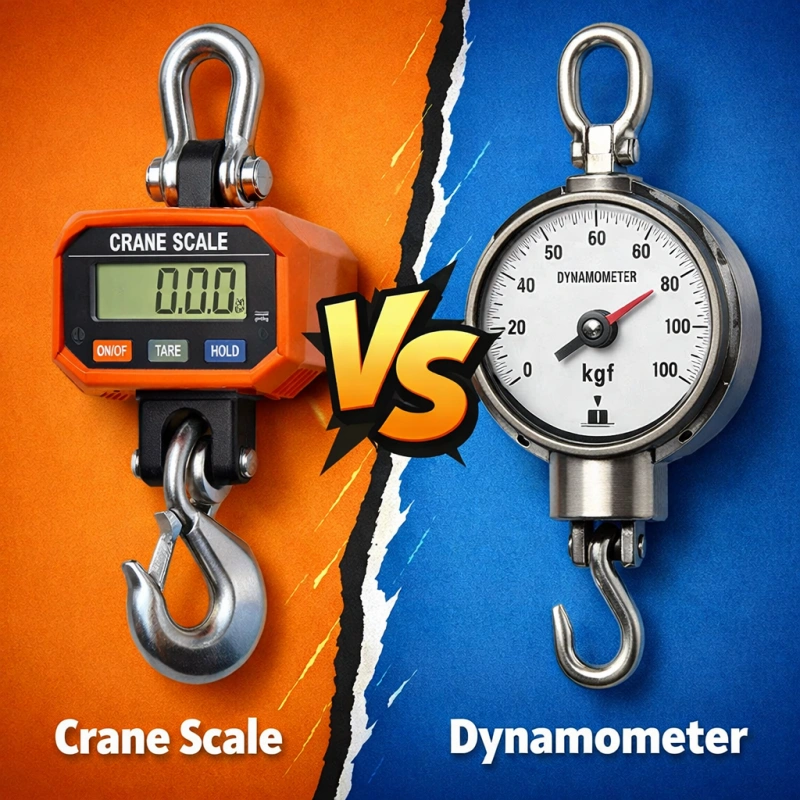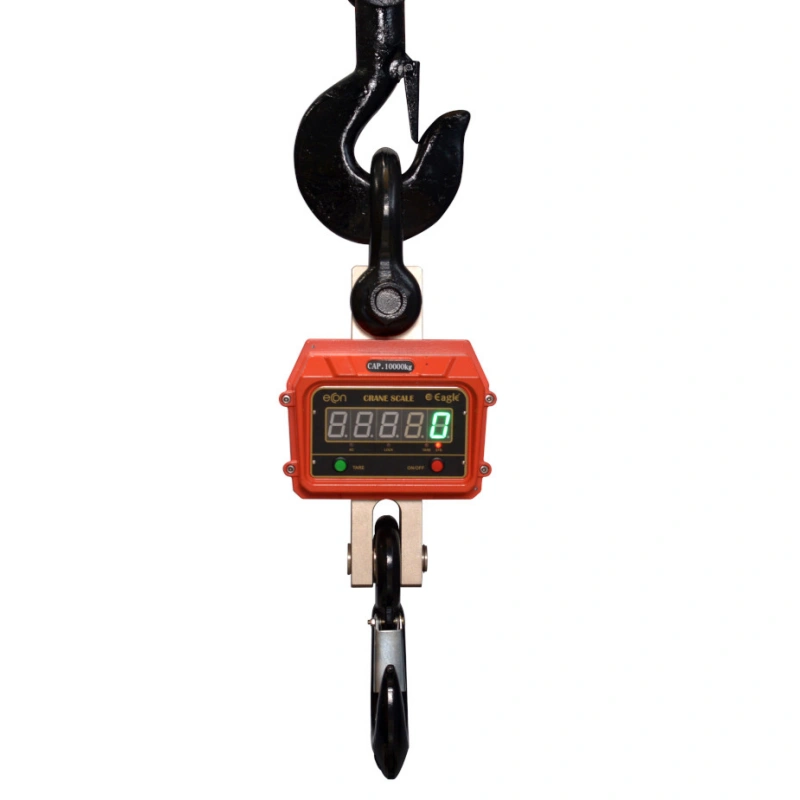If you want to choose the right chain for your job, you need to know the difference between chain grades. Grade 70 chain uses heat-treated carbon steel and works best for securing cargo and towing.
You should not use it for overhead lifting. Grade 80 chain is made from high-strength alloy steel and is designed for overhead lifting and heavy-duty tasks. Safety is critical, so always match the chain grade to your application and meet all regulations. Powerful Machinery provides certified chains you can trust.
| Chain Grade | Description | Usage | Regulatory Notes |
|---|---|---|---|
| Grade 70 | Heat-treated carbon steel, 20% stronger than Grade 43 | Heavy-duty hauling, not for overhead lifting | FMCSA cargo securement regulations apply |
| Grade 80 | High-strength alloy steel, heat-treated for strength | Overhead lifting, rigging, and construction | FMCSA cargo securement regulations apply |
Key Takeaways
- Grade 70 chain is ideal for securing cargo and towing, but never use it for overhead lifting.
- Grade 80 chain is made for overhead lifting and heavy-duty tasks, meeting strict safety standards.
- Always check the working load limit (WLL) of the chain before use to ensure safety and compliance.
- Inspect chains regularly for damage, elongation, or rust to maintain safety during operations.
- Choose the right chain grade based on load weight and application to enhance safety and performance.
Chain Grades Overview
What Are Chain Grades?
When you choose a chain for lifting or securing loads, you need to understand chain grades. Chain grades are numbers that show the material type, manufacturing process, and intended use of a chain. These grades help you know if a chain is strong enough for your job and if it meets safety standards.
Chain grades range from basic to high-performance. Each grade has a specific material and application. You can see the main chain grades and their uses in the table below:
| Chain Grade | Material Type | Applications | Compliance with Standards |
|---|---|---|---|
| Grade 30 | Zinc-plated, hot galvanized | General-purpose applications | Not suitable for overhead lifting |
| Grade 70 | Heat-treated carbon steel | Load securing and towing | Meets transport standards |
| Grade 80 | Alloy steel | Overhead lifting, towing heavy loads | Compliant with NACM, ASTM, and OSHA specifications |
| Grade 100 | Alloy steel | Overhead lifting, towing very heavy loads | 25% stronger than Grade 80, compliant with NACM, ASTM, OSHA |
You should always match the chain grade to your task. Using the wrong grade can lead to accidents or equipment failure. Powerful Machinery offers a full range of certified chain grades, so you can find the right product for your needs.
Tip: Always check the chain grade before starting any lifting or transport job. This simple step helps you stay safe and compliant.
Grade 70 Chain vs Grade 80 Chain
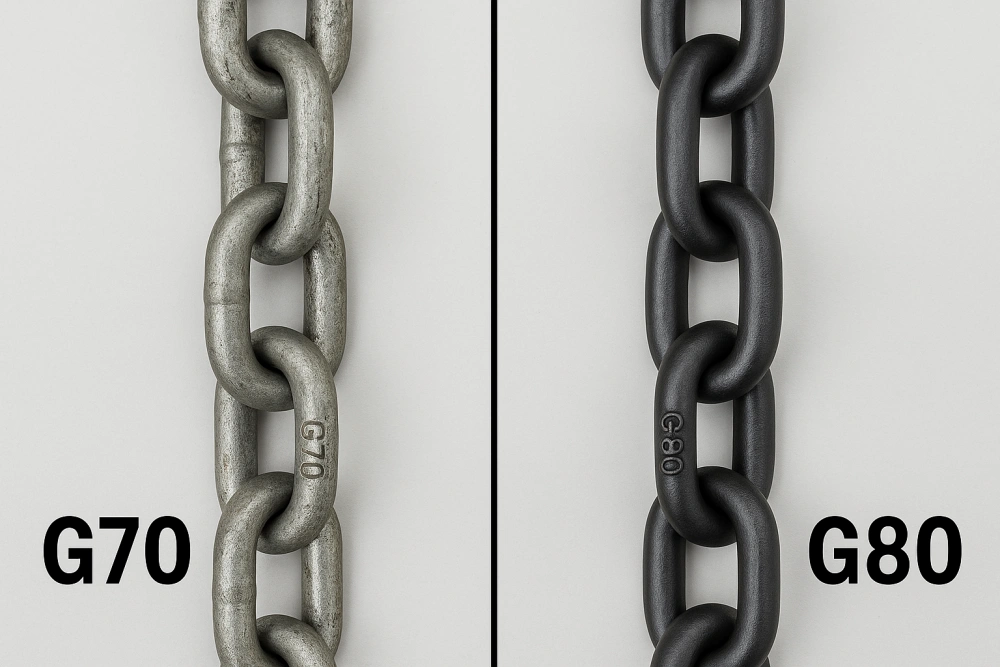
You might wonder how grade 70 chain and grade 80 chain compare. These two chain grades look similar, but they have important differences in material, approved uses, and safety.
| Feature | Grade 70 Chain | Grade 80 Chain |
|---|---|---|
| Material | Heat-treated carbon steel | Heat-treated steel |
| Strength | Not suitable for overhead lifting | Safe for overhead lifting |
| Approved Uses | Towing, logging, oil rigs, safety applications | Recovery, safety, towing, and securing heavy-duty loads |
| Finish | Gold chromate finish | Specific type of clevis grab hook |
Grade 70 chain works best for securing loads during transport, towing, and logging. You should not use it for overhead lifting. Grade 80 chain is made for overhead lifting and heavy-duty recovery. It meets strict safety standards, so you can use it for lifting slings and securing industrial loads.
Powerful Machinery manufactures both grade 70 and grade 80 chain grades. Each chain meets or exceeds industry standards, including NACM, ASTM, and OSHA. You can trust these products for reliable performance in demanding environments.
Note: Chain grades impact safety and performance. Grade 70 chain is strong for transport, but only grade 80 chain is safe for lifting above people or equipment.
Composition and Material
Grade 70 Chain: Carbon Steel
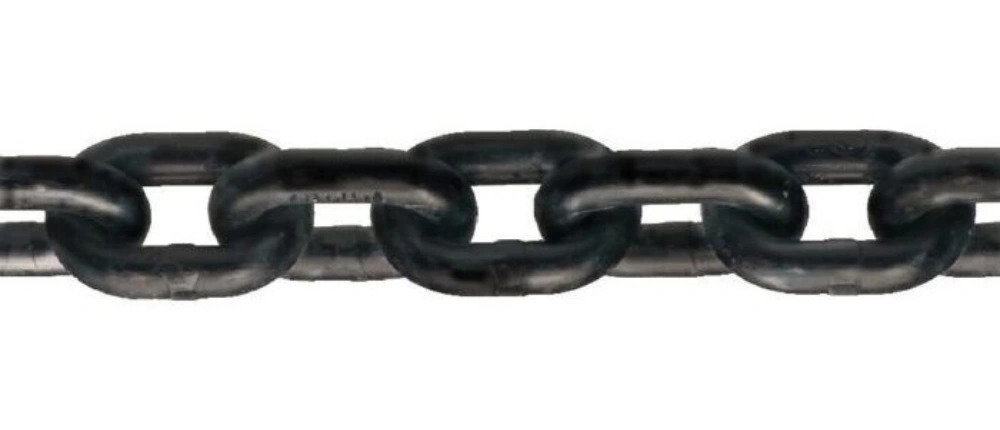
When you look at grade 70 chains, you see a product made from heat-treated carbon steel. This material gives the chain its strength and durability. The carbon steel used in these chains contains about 0.70% carbon, which increases hardness and toughness. Here are some key properties:
- Tensile Strength: 600 – 800 MPa (87 – 116 ksi)
- Yield Strength: 350 – 500 MPa (51 – 73 ksi)
- Elongation: 12 – 18%
- Hardness: 20 – 30 HRC
- Impact Strength: 20 – 30 J (15 – 22 ft-lbf)
- Corrosion Resistance: Moderate, so you need protective finishes in harsh environments
The heat treatment process makes grade 70 chains about 20% stronger than grade 43 chains. This extra strength helps you secure heavy loads safely during transport. Powerful Machinery’s G70 Transport Chain uses this high-quality carbon steel and advanced heat treatment to deliver reliable performance for cargo control and towing.
Grade 80 Chain: Alloy Steel
Grade 80 alloy chain uses a special blend of steel with added elements like manganese and silicon. These alloying elements boost the chain’s strength, toughness, and ability to handle stress.
You can trust a grade 80 alloy chain to carry heavier loads without bending or breaking. The manufacturing process spreads stress evenly across the chain, which means better performance and safety.
- Alloy steel chains have higher tensile strength than carbon steel chains.
- They resist deformation and failure under heavy loads.
- The composition allows for better durability and energy absorption.
Powerful Machinery’s G80 Alloy Chain meets strict industry standards, including NACM and OSHA. You get a chain that is tested for overhead lifting and heavy-duty rigging. The grade 80 alloy chain stands out for its reliability in demanding environments.
Always check for compliance with NACM and OSHA standards when you select a grade 80 alloy chain for lifting tasks.
Identification and Finishes
You can quickly identify grade 70 and grade 80 chains by their finishes and markings:
- Grade 70 chains often have a gold chromate or yellow zinc finish. This makes them easy to spot and helps with corrosion resistance, but they may still corrode over time in tough conditions.
- Grade 80 alloy chain usually features a black finish. This coating offers better protection against rust and wear, making it ideal for harsh environments.
- Markings on the chain links or tags help you confirm the grade and manufacturer.
When you choose a chain from Powerful Machinery, you get clear markings and high-quality finishes. These features help you stay safe and compliant on every job.
Strength and Working Load Limits
WLL Comparison by Size
When you select a chain for your job, you need to know how much weight it can safely handle. This is called the working load limit. The working load limit tells you the maximum weight you can apply to the chain during normal use.
Grade 80 chain always offers higher strength than grade 70 chain of the same size. You should never exceed these limits to keep your worksite safe.
Here is a quick comparison of working load limits for common chain sizes:
| Chain Size (inch) | Grade 70 WLL (lbs) | Grade 80 WLL (lbs) |
|---|---|---|
| 1/4″ | 3,150 | 3,500 |
| 5/16″ | 4,700 | 4,500 |
| 3/8″ | 6,600 | 7,100 |
| 7/16″ | 8,760 | 10,000 |
| 1/2″ | 11,300 | 12,000 |
| 5/8″ | 15,800 | 18,100 |
Grade 70 chain is strong for tie-downs and towing, but grade 80 chain is the right choice for overhead lifting. Grade 80 chain can handle up to 47,700 lbs in larger sizes, making it ideal for heavy-duty lifting.
Tip: Always check the chain tag or markings before use. Never use a chain for lifting if it is not rated for that purpose.
Durability and Performance
You want a chain that stands up to tough jobs. Grade 80 chain uses alloy steel, which gives it higher tensile strength and better resistance to wear. This means it can handle more force before reaching its ultimate breaking strength.
Grade 70 chain, made from heat-treated carbon steel, is reliable for transport and towing, but it is not designed for lifting above people or equipment.
Powerful Machinery’s G80 Lifting Chain and G70 Transport Chain both meet strict industry standards. The G80 Lifting Chain is tested to 2.5 times its working load limit, so you get extra safety and peace of mind.
The G70 Transport Chain is 25% stronger than standard chains for cargo control. Both chains resist fatigue and damage from repeated use, but you should always inspect them for signs of wear.
Regular inspection helps you catch problems early and keeps your operation safe.
G80 vs G70 Chain: Safety Standards and Compliance
Grade 70 Chain: Transport Regulations
When you use a grade 70 chain for securing cargo, you must follow Department of Transportation (DOT) rules. These regulations help you keep your loads safe during transport.
The DOT sets clear requirements for securement systems and devices. You need to pay attention to working load limits and use tie downs correctly, especially for very heavy loads. The table below shows key DOT requirements for grade 70 chain:
| Requirement | Description |
|---|---|
| Securement systems | Use vehicle parts like headboards, bulkheads, posts, stakes, and anchor points. |
| Securing devices | Hold cargo in place with chains, ropes, webbing, clamps, latches, binders, shackles, and hooks. |
| Working load limit | Never exceed the safe force set by the manufacturer. |
| Tie downs | Attach and restrain cargo with the right combination of devices. |
| Cargo weight | Secure all four corners for articles weighing 10,000 pounds or more. |
| Edge protection | Use protection if tie downs touch cargo and risk abrasion. |
You must always check the chain’s working load limit before use. Powerful Machinery’s grade 70 chain meets DOT standards, giving you confidence in every transport job.
Grade 80 Chain: Lifting Standards
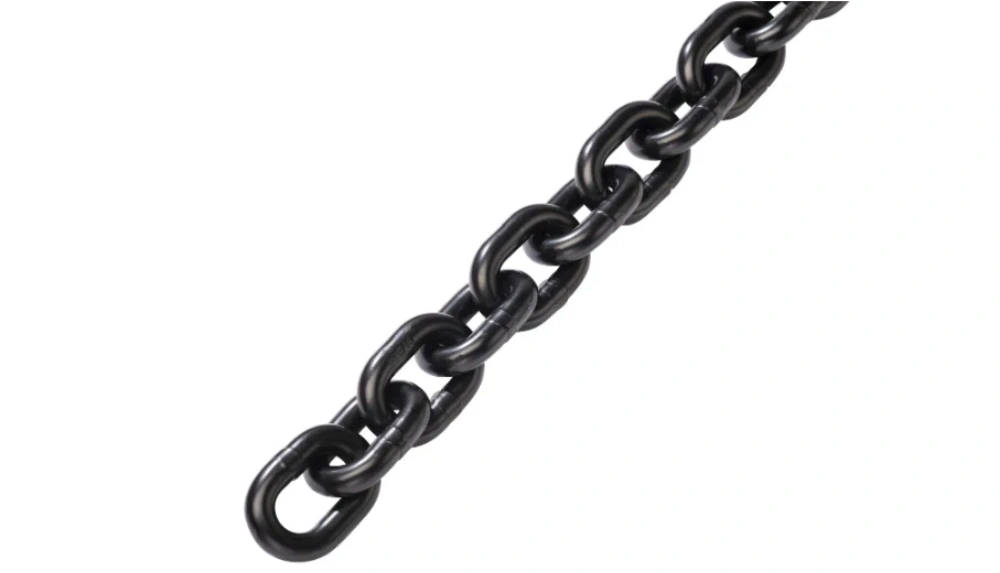
If you need to lift very heavy loads, you should choose a grade 80 chain. This chain meets strict standards from OSHA, ASTM, and ASME. These organizations set rules for overhead lifting to protect you and your team. Grade 80 chain is manufactured to meet or exceed these safety standards.
You can use it for lifting very heavy loads in construction, marine, and industrial settings. Powerful Machinery’s grade 80 chain carries certifications that match both U.S. and international requirements. You get reliable strength and safety every time.
- OSHA (Occupational Safety and Health Administration)
- ASTM (American Society for Testing and Materials)
- ASME (American Society of Mechanical Engineers)
Inspection and Safe Use
You need to inspect your chain regularly to keep your operation safe. Look for damage, cracks, or elongation. Clean your chain monthly with a wire brush and lubricate the links with lithium-based grease. Replace any chain that shows more than 10% elongation or visible cracks.
Always select the correct chain grade for your job and avoid overloading. Maintain proper rigging angles to keep the working load limit safe.
Clean chains monthly with a wire brush. Lubricate links using lithium-based grease. Replace chains with more than 10% elongation or visible cracks.
Powerful Machinery’s chains meet international safety standards and undergo rigorous testing. You can trust their products for both transport and lifting applications.
G70 vs G80 Chain: Application Comparison
Grade 70 Chain: Load Securement and Towing
You often see grade 70 chain in the trucking and transportation industry. This chain is essential for load securement and towing because it offers high strength and reliability. You can use it to secure heavy machinery, steel, logs, vehicles, shipping containers, and portable buildings.
Grade 70 chain works well for trailer tie-downs and heavy load securement.
Before you use this chain, always inspect it for deformities, cracks, or rust. Make sure you anchor tie-downs to the trailer’s designated points or the vehicle’s frame. Distribute tie-downs evenly across your cargo to reduce the risk of damage.
Powerful Machinery’s G70 Transport Chain gives you the confidence to handle tough jobs while meeting industry standards.
- Common applications:
- Trucking and trailer tie-downs
- Securing heavy equipment and cargo
- Towing vehicles and machinery
Tip: Always check the working load limit and never use grade 70 chain for overhead lifting.
Grade 80 Chain: Overhead Lifting and Rigging
Grade 80 chain is suitable for overhead lifting and heavy-duty rigging. You can use it for lifting loads with cranes, pulling excavation equipment, and fabricating chain slings. This chain is also used in heavy vehicle recovery and cargo control.
Grade 80 chain meets strict safety standards, so you can trust it for lifting tasks where safety is critical.
| Applications | Safety Standards and Tips |
|---|---|
| Overhead lifting by crane operators | Never transport or suspend loads over people |
| Heavy vehicle recovery | Inspect chains for cracks, gouges, and wear |
| Pulling excavation equipment | Remove the chain from service if below the minimum thickness |
| Fabricated into chain slings | Use only grade 80 components to maintain a safe load rating |
Powerful Machinery’s G80 Lifting Chain and G80 Alloy Chain are designed for these demanding applications. You get high strength and durability for every lift.
Common Mistakes to Avoid
You should never use grade 70 chain for overhead lifting. This chain is not suitable for overhead lifting and can fail under heavy loads. Overloading the hoist or ignoring regular inspections can lead to equipment failure and accidents. Improper rigging also increases the risk of incidents.
- Avoid these mistakes:
- Using a grade 70 chain for lifting above people or equipment
- Overloading any chain beyond its working load limit
- Skipping regular inspections for wear, cracks, or elongation
- Using improper rigging techniques
Note: Pushing a chain beyond its rated limits can cause permanent damage and increase the risk of accidents. Always match the chain to your application and follow safety guidelines.
G70 or G80 Chain: Selecting the Right Chain
Application and Safety Needs
When you select a chain for your job, you need to think about the specific applications and the level of safety required. Start by looking at the weight of your load. Heavier loads need a higher-grade chain. If you plan to use the chain for overhead lifting, grade 80 is the right choice.
For cargo securement or towing, grade 70 works well. You should also consider how often you will use the chain. Frequent use, especially in lifting, means you need a chain that resists fatigue and lasts longer.
Here are some important factors to help you decide:
- Load weight: Heavier loads require stronger chains.
- Environmental conditions: If you work in wet or corrosive areas, choose a chain with a protective finish.
- Frequency of use: Chains used often should be more durable.
- Safety margin: Always pick a chain with a higher working load limit than your maximum load.
Powerful Machinery offers both grade 70 and grade 80 chains, so you can find the right fit for your needs.
Regulatory Considerations
You must follow all rules and standards when choosing a chain. Grade 70 chains meet DOT and FMCSA regulations for cargo securement. Grade 80 chains meet OSHA, ASTM, and NACM standards for lifting. Always check the markings and certifications on your chain before use.
Powerful Machinery provides certified products and can help you understand which chain meets the rules for your applications. Their team can also guide you through compliance for special projects.
Tip: Always match the chain grade to the job and check for required certifications.
Cost and Value
Cost matters, but you should also think about value. Grade 70 chains are usually less expensive and work well for transport and towing. Grade 80 chains are more expensive, but they offer higher strength and last longer in demanding lifting jobs.
If you need a custom solution, Powerful Machinery can help you design a chain that fits your budget and your job. Their support team can answer questions and help you choose the best option for your applications.
Choosing the right chain saves money and keeps your team safe.
Conclusion
You need to choose the right chain for your job to stay safe and meet industry standards. Grade 70 chains work well for cargo securement and transportation, while grade 80 chains give you higher strength and safety for lifting and heavy-duty tasks. Check the table below for a quick comparison:
| Chain Grade | Safety Features | Strength | Compliance | Applications |
|---|---|---|---|---|
| Grade 70 | Good for moderately heavy loads | 4,700 lbs WLL | Inspect for elongation and damage | Transportation and logistics |
| Grade 80 | Higher safety margin for lifting | Higher strength | Inspect stress points and links | Construction, heavy lifting |
Always inspect your chain before use. Powerful Machinery provides certified solutions you can trust for every application.
FAQ
What is the main difference between Grade 70 and Grade 80 chain?
Grade 70 chain uses heat-treated carbon steel for transport and towing. Grade 80 chain uses alloy steel for overhead lifting. You should never use Grade 70 chain for lifting above people or equipment.
Can you use a Grade 70 chain for overhead lifting?
No, you cannot use Grade 70 chain for overhead lifting. Only Grade 80 chain meets the safety standards for lifting loads above people or equipment.
How do you identify the grade of a chain?
Look for markings on the chain links or tags. Grade 70 chains often have a gold or yellow finish. Grade 80 chains usually have a black finish. Always check the manufacturer’s markings for confirmation.
How often should you inspect your chain?
You should inspect your chain before each use. Look for cracks, elongation, or rust. Replace any chain that shows damage. Regular inspection keeps your worksite safe.
Where can you buy certified Grade 70 and Grade 80 chains?
You can buy certified Grade 70 and Grade 80 chains from Powerful Machinery. The company offers products that meet international safety standards. Visit their official website for more information.

